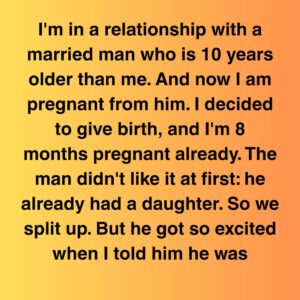I moved into that apartment three weeks after my husband died. It wasn’t a fresh start. It was survival. The bills, the medical debt—they stripped everything from me. The place was cheap. Suspiciously cheap. And it didn’t take long to figure out why.
The first time I met him, I was walking back from the corner store, arms heavy with groceries, nerves worn thin. He was huge—tank top, sneakers the size of microwaves, spiral tattoos winding down both arms. He crossed the street toward me like he knew I’d flinch.
My heart thudded. I gripped my purse tighter, tried to act unbothered. But panic isn’t easy to mask.
“Are you okay, ma’am?”
His voice was deep, but soft. Calmer than I expected.
I hesitated, then gave the only answer that felt honest: “I don’t feel safe here.”
He scanned the street, then nodded.
“Yeah, I get that. That’s why I stay. To make sure people like you aren’t alone out here.”
Without another word, he grabbed one of my bags and walked beside me. We didn’t say much, but his presence made the sidewalk feel less dangerous. When we reached my porch, I asked, “Why do you do this?”
“Someone once did it for my mom,” he said with a small smile. “Changed her life. Changed mine too.”
He left before I could reply.
The next morning, I found a paper bag on my front step. A handwritten note was taped to it:
“Fresh from Miss Anita’s—start with the peach scone.”
Inside were three warm pastries. No name. But I knew.
In the days that followed, I watched him again and again—helping an elderly man with groceries, joking with neighborhood kids, even stepping into an argument outside the liquor store before it escalated.
I asked about him at the corner shop.
“That’s Marcus,”
the woman behind the counter said.
“Lives a couple blocks over with his sister. Good guy. Been through hell.”
When I gently asked what kind, she leaned closer.
“Lost his dad young. Mom raised them. He got in trouble, but turned it around. Now he’s in school, works at the rec center. Keeps this whole neighborhood breathing.”
That night, I wrapped up a banana bread loaf and brought it to the rec center. He was chatting with a couple of teens on the steps. When he saw me, he stood.
“I figured you left the pastries,” I said, holding out the foil-wrapped loaf.
He smiled.
“Busted.”
“It’s just a thank-you.”
“And it means a lot,” he said. “Thanks for seeing me before judging me.”
We started talking more. He was only twenty-eight, though he carried himself with the weight of someone twice that. His sister, Leila, was seventeen and about to graduate. He worked during the day, studied at night.
One day he knocked on my door with a toolbox.
“Saw your porch light flickering. Figured I’d fix it before it went out.”
I made tea while he worked. After that, he checked in regularly. I started cooking more. Something warm for every visit.
Then, one night, I woke to shouting. A woman’s voice—sharp and scared. I peered through the blinds and saw two people under a flickering streetlight. One held a bottle.
I called Marcus.
“There’s something happening outside,” I whispered. “She’s in trouble.”
“Stay inside. I’m on my way.”
Minutes later, I watched him step into the chaos. Calm. Unshaken. The man backed off. The woman cried.
The next morning, she sipped coffee on Marcus’s porch with Leila. It wasn’t just that he helped—he was building something back.
Then, silence.
A day passed. Then two.
On the third, Leila came by, eyes swollen.
“He’s in the hospital,” she said softly. “Jumped on his way home from class. They took his wallet. He fought back… they beat him badly.”
I visited him the next day. Banana bread in hand, flowers too. His face was bruised, arm in a sling.
“Turns out,” he rasped, “I’m not bulletproof.”
“You don’t have to fix everything,” I told him. “Let someone else try for a change.”
He smiled through the pain.
“But who else will?”
That’s when I realized: maybe it could be me.
So I walked Miss Clara to the store. Picked up trash from the playground. Started a food drive for a family down the street. I wasn’t Marcus. But I could still show up.
People noticed.
Kids turned down their music when they saw me. Tre, one of the teens, started walking Miss Clara’s dog at night. A quiet woman brought soup when she heard Marcus was recovering.
We weren’t perfect. But we were trying.
Marcus returned to the rec center two months later. He walked slower, but smiled just the same.
“You’ve turned this place around,” he said.
“No,” I replied. “You did. I just kept it going.”
That summer, we threw a block party—music, food, laughter. Even the landlord showed up and offered to repaint the buildings and fix the lights.
Later that night, Marcus and I sat on my porch. He had a popsicle. I had iced tea.
“When I first moved here, I was terrified,” I said.
“I remember,” he replied.
“Now… I feel like I belong.”
He nodded.
“That’s the goal.”
After a pause, he added,
“My mom passed five years ago. She used to say, ‘We’re not here just to survive. We’re here to leave it better than we found it.’”
I blinked fast, holding back tears.
“She’d be proud of you.”
He looked down at his melting popsicle.
“We’d make her proud.”
Time passed. Leila left for college. Tre applied to be a firefighter. Someone planted flowers outside the corner shop.
Then one day, the landlord called.
“We’re lowering your rent by $100,” she said.
“Why?” I asked.
“Fewer complaints. More lease renewals. Just keep doing what you’re doing.”
As I walked out that day, I saw Marcus jogging past.
“Hey!” I called. “You free Saturday?”
“What’s up?”
“The kids want to plant sunflowers. Thinking a little garden workshop.”
“I’ll bring the shovels.”
Looking back, I never expected this broken street to become my home.
But sometimes, the most forgotten places just need someone who stays.
If you’re searching for a better place, maybe you don’t need to leave.
Maybe you just need to become the reason it gets better.
If this story moved you, like it, share it, or pass it on. Someone next door might need to hear that hope still lives—right here, among us.





